Das Deutsche Lied/The German song (Karl Pindl, 1928) was a silent film produced by the Döring film company in Hannover, under guidance of the Deutsche Sängerbund (DSB), the singers union. The film had its premiere in Vienna, Austria, at the 10th German Sängerbundesfest (Singers Union Festival) between 19 and 23 July 1928.The German premiere took place on 6 November 1928 at the Berlin Titania-Palast. Das Deutsche Lied honored the social status and historical significance of German songwriting. The film was scripted by Ferdinand Schneider and William Torge, while Karl Pindl directed the film. Sets were by Artur Günther, cinematography by Hugo Urban and August Lutz.
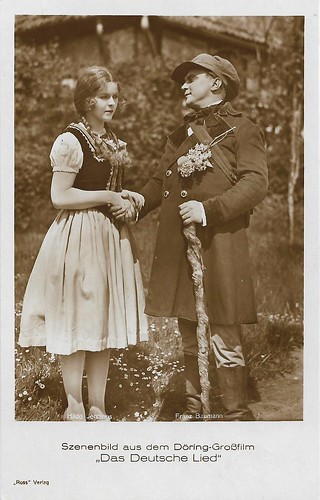
German postcard by Ross Verlag. Photo: Döring Film. Publicity still for Das Deutsche Lied (Karl Pindl, 1928) with Franz Baumann as Konrad Forster and Hilda Jennings as Hilde Lenz, singing the song 'Muss i' denn, muss i' denn...'.
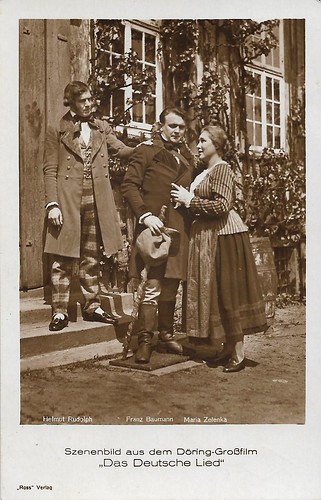
German postcard by Ross Verlag. Photo: Döring Film. Publicity still for Das Deutsche Lied (Karl Pindl, 1928) with Helmut Rudolph, Maria Zelenka, and Franz Baumann perform the song 'Nun leb' wohl, du kleine Gasse!' Konrad Forster (Hetmut Rudolph) says goodbye to his parents Johannes and Katharina.
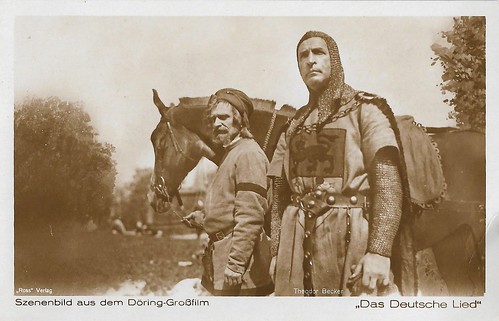
German postcard by Ross Verlag. Photo: Döring Film. Publicity still for Das Deutsche Lied (Karl Pindl, 1928) with Theodor Becker as Graf Otto von Meran, in the historical part of the film.
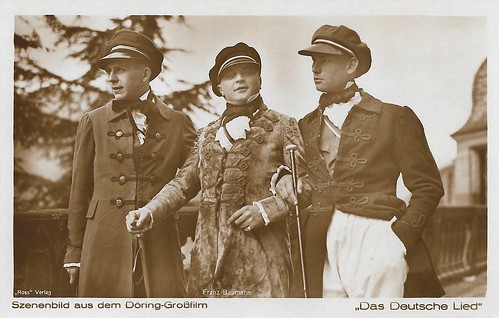
German postcard by Ross Verlag. Photo: Döring Film. Publicity still for Das Deutsche Lied (Karl Pindl, 1928) with Franz Baumann performing the song 'Alt Heidelberg, du feine!'
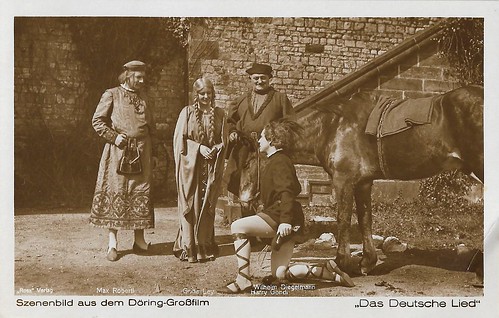
German postcard by Ross Verlag. Photo: Döring Film. Publicity still for Das Deutsche Lied (Karl Pindl, 1928) with Max Roberti as Graf Kuno von Eisack, Gritta Ley as his daughter Irmgard, Harry Gondi as Walther von der Vogelweide, and Wilhelm Diegelmann as Burgvogt, in the historical part of the film.
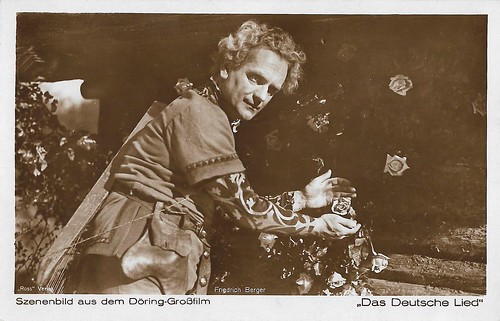
German postcard by Ross Verlag. Photo: Döring Film. Publicity still for Das Deutsche Lied (Karl Pindl, 1928) with Friedrich Berger as the 'Minnesänger' Reinmar von Hagenau, teacher of Walther von der Vogelweide, in the historical part of the film.
English Wikipedia: "Reinmar von Hagenau (died before 1210) was a German minnesinger of the twelfth century, surnamed in the MSS. der Alte (the old) to distinguish him from later poets of that name. [...] most of Reinmar's poems show more elegance of form than beauty of sentiment. In a society, however, where form was valued more than contents, such poetry was bound to meet with favour."
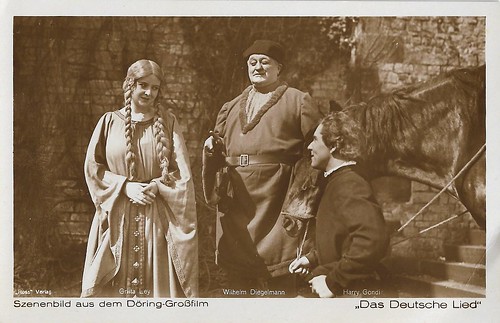
German postcard by Ross Verlag. Photo: Döring Film. Publicity still for Das Deutsche Lied (Karl Pindl, 1928) with Gritta Ley as Irmgard, Harry Gondi as Walther von der Vogelweide, and Wilhelm Diegelmann as Burgvogt, in the historical part of the film.
English Wikipedia: "Walther von der Vogelweide (c. 1170 – c. 1230) was a Minnesänger, who composed and performed love-songs and political songs ("Sprüche") in Middle High German. Walther has been described as greatest German lyrical poet before Goethe. His hundred or so love-songs are widely regarded as the pinnacle of 'Minnesang', the medieval German love lyric, and his innovations breathed new life into the tradition of courtly love. He is also the first political poet writing in German, with a considerable body of encomium, satire, invective, and moralising."
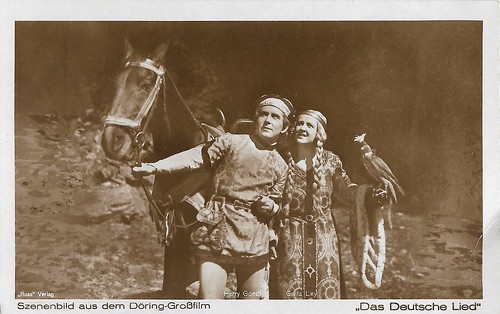
German postcard by Ross Verlag. Photo: Döring Film. Publicity still for Das Deutsche Lied (Karl Pindl, 1928) with Gritta Ley as Irmgard and Harry Gondi as Walther von der Vogelweide, in the historical part of the film.
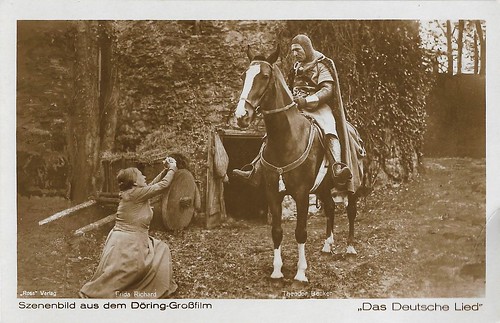
German postcard by Ross Verlag. Photo: Döring Film. Publicity still for Das Deutsche Lied (Karl Pindl, 1928) with Theodor Becker as Graf Otto von Meran (Otto, Count of Merania) and Frida Richard as Frau Hilde (mother of Walther von der Vogelweide), in the historical part of the film.
Source: Wikipedia and IMDb.

German postcard by Ross Verlag. Photo: Döring Film. Publicity still for Das Deutsche Lied (Karl Pindl, 1928) with Franz Baumann as Konrad Forster and Hilda Jennings as Hilde Lenz, singing the song 'Muss i' denn, muss i' denn...'.

German postcard by Ross Verlag. Photo: Döring Film. Publicity still for Das Deutsche Lied (Karl Pindl, 1928) with Helmut Rudolph, Maria Zelenka, and Franz Baumann perform the song 'Nun leb' wohl, du kleine Gasse!' Konrad Forster (Hetmut Rudolph) says goodbye to his parents Johannes and Katharina.

German postcard by Ross Verlag. Photo: Döring Film. Publicity still for Das Deutsche Lied (Karl Pindl, 1928) with Theodor Becker as Graf Otto von Meran, in the historical part of the film.

German postcard by Ross Verlag. Photo: Döring Film. Publicity still for Das Deutsche Lied (Karl Pindl, 1928) with Franz Baumann performing the song 'Alt Heidelberg, du feine!'

German postcard by Ross Verlag. Photo: Döring Film. Publicity still for Das Deutsche Lied (Karl Pindl, 1928) with Max Roberti as Graf Kuno von Eisack, Gritta Ley as his daughter Irmgard, Harry Gondi as Walther von der Vogelweide, and Wilhelm Diegelmann as Burgvogt, in the historical part of the film.

German postcard by Ross Verlag. Photo: Döring Film. Publicity still for Das Deutsche Lied (Karl Pindl, 1928) with Friedrich Berger as the 'Minnesänger' Reinmar von Hagenau, teacher of Walther von der Vogelweide, in the historical part of the film.
English Wikipedia: "Reinmar von Hagenau (died before 1210) was a German minnesinger of the twelfth century, surnamed in the MSS. der Alte (the old) to distinguish him from later poets of that name. [...] most of Reinmar's poems show more elegance of form than beauty of sentiment. In a society, however, where form was valued more than contents, such poetry was bound to meet with favour."

German postcard by Ross Verlag. Photo: Döring Film. Publicity still for Das Deutsche Lied (Karl Pindl, 1928) with Gritta Ley as Irmgard, Harry Gondi as Walther von der Vogelweide, and Wilhelm Diegelmann as Burgvogt, in the historical part of the film.
English Wikipedia: "Walther von der Vogelweide (c. 1170 – c. 1230) was a Minnesänger, who composed and performed love-songs and political songs ("Sprüche") in Middle High German. Walther has been described as greatest German lyrical poet before Goethe. His hundred or so love-songs are widely regarded as the pinnacle of 'Minnesang', the medieval German love lyric, and his innovations breathed new life into the tradition of courtly love. He is also the first political poet writing in German, with a considerable body of encomium, satire, invective, and moralising."

German postcard by Ross Verlag. Photo: Döring Film. Publicity still for Das Deutsche Lied (Karl Pindl, 1928) with Gritta Ley as Irmgard and Harry Gondi as Walther von der Vogelweide, in the historical part of the film.

German postcard by Ross Verlag. Photo: Döring Film. Publicity still for Das Deutsche Lied (Karl Pindl, 1928) with Theodor Becker as Graf Otto von Meran (Otto, Count of Merania) and Frida Richard as Frau Hilde (mother of Walther von der Vogelweide), in the historical part of the film.
Source: Wikipedia and IMDb.
No comments:
Post a Comment